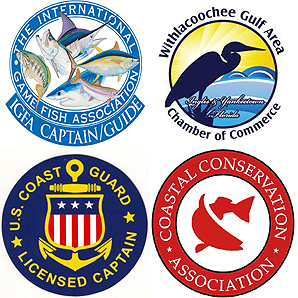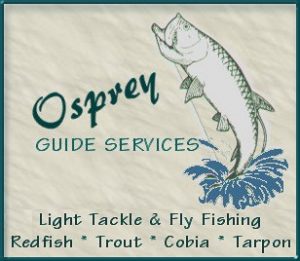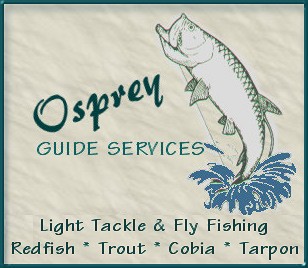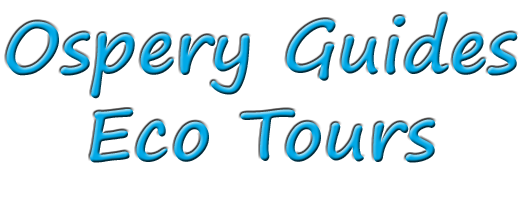Capt. Rick LeFiles
My name is Captain Rick LeFiles. As a young boy in Valdosta, Ga. most of my spare time was spent fishing in my backyard pond or with my Grandfather at his weekend retreat south of town near Lake Park. He was a great guy teaching me how to fresh water fish and instilling in me a high appreciation for wildlife and the great outdoors. Some years later I followed my dad and brothers into the automobile field but always managed to get to the many lakes back home to continue honing my fishing skills. Some twenty-five years slipped by and I had become a weekend bass tournament angler, pursuing contest all over the Deep South. In 1991 I took a couple of friends out fishing with me on the first trip in my new saltwater boat. That trip changed my fishing life. We caught redfish through the entire tide and we had double and triple hook-ups until we were tired of catching them. I was hooked on flats fishing and a few years later took up fly fishing as my primary way to ply the saltwater. I soon developed a passion for catching Tarpon on fly and have dedicated the better part of fifteen years to educating myself as much as possible about this wonderful specie. In the Spring of 2000 I opened Osprey Guide Service specializing in Giant Tarpon while also pursing all other saltwater game fish. I became a Orvis endorsed by the Nature Coast Fly in 2004. I currently reach the Gulf with my clients from Blackwater Grill and Bar located at 6301 Riverside Dr., Yankeetown, Florida 34498, on the beautiful Withlachoochee River located in Yankeetown, Fl.
CREDENTIALS
USCG Licensed Master Captain
USCG Certified in CPR and First Aid
IGFA Certified Captain
CCA Certified Captain
Member Withlacoochee – Gulf Area Chamber of Commerce
Maritime Consortium Certified Drug-Free Vessel
State Licensed and Insured
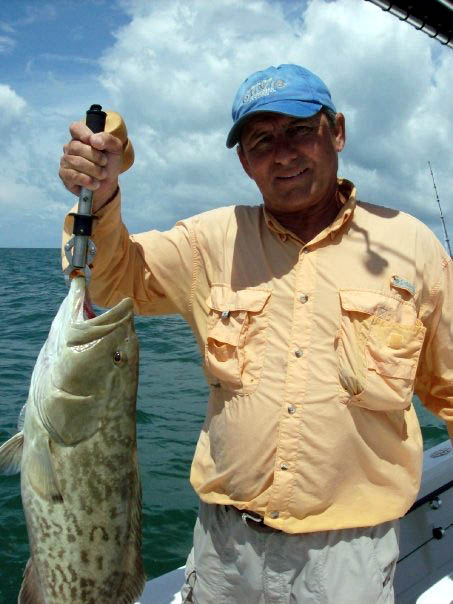
Captain Rick LeFiles
Adventures with Alligators
ADVENTURES WITH ALLIGATORS
From Harper’s Weekly, January 6, 1883, pages 9 & 10
Author to be determined
Illustrated by W. P. Snyder.
Scanned material from the original publication provided by Kyle VanLandingham from which a transcription was made by William LaMartin. The punctuation in the article below, while different in many cases from modern usage, is true to the original manuscript.
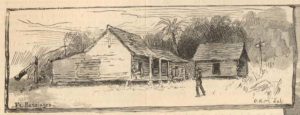 Late one evening last February I sat on the porch of John Pierce’s [Pearce’s] hospitable though modest log house at Fort Bassinger, listening to tales of wild frontier life told by my host and his stalwart sons. Fort Bassinger is situated on the west bank of the Kissimmee River, in South Florida, and is, in that direction, the most advanced outpost of civilization, there being no settlers between it and the dread Okeechobee, fifty miles to the south, and but half a dozen along the whole course of the Kissimmee River, two hundred and fifty miles to the north. It is now a fort only in name, though during the Seminole war it was the site of a permanent encampment of troops. At present Fort Bassinger consists of the log dwelling-house and out-buildings owned by John Pierce, a cattle man, whose wealth lies in the herds which roam the broad prairies of South Florida.
Late one evening last February I sat on the porch of John Pierce’s [Pearce’s] hospitable though modest log house at Fort Bassinger, listening to tales of wild frontier life told by my host and his stalwart sons. Fort Bassinger is situated on the west bank of the Kissimmee River, in South Florida, and is, in that direction, the most advanced outpost of civilization, there being no settlers between it and the dread Okeechobee, fifty miles to the south, and but half a dozen along the whole course of the Kissimmee River, two hundred and fifty miles to the north. It is now a fort only in name, though during the Seminole war it was the site of a permanent encampment of troops. At present Fort Bassinger consists of the log dwelling-house and out-buildings owned by John Pierce, a cattle man, whose wealth lies in the herds which roam the broad prairies of South Florida.
Suddenly, as we talked, the light of a camp fire streamed across the waters of the river a quarter of a mile below the house, and curiosity impelled us to visit the new-comers and inquire concerning them. On reaching the fire we found but one man stretched at length beside it, and patiently watching the roasting of a wild turkey that he had shot some hours before. He was Frank Lefiles, the best known and most successful alligator-hunter and guide of South Florida. For nearly twelve years he has made this Floridian wilderness his home, and is intimately acquainted with its most hidden secrets. Clad in hunter’s garb and with hair and beard tawny as a lion’s name, and uncut during his years of sojourn in the wilderness, his personal appearance was a picturesque as it was remarkable.
He was bound for the vicinity of Lake Okeechobee, on an alligator hunt, and readily consented that I should accompany him and share his labors; though he warned me that the trip would be arduous, and not devoid of danger.
We started at daybreak next morning, the hunter in a stanch cypress skiff, and I in the light cedar canoe in which I was exploring those southern wilds. All day long we glided down the swift-flowing crooked river, through its monotonous sameness of wide-spread swamps and lagoons of backwater–“dead rivers.” They are called–filled with water-lettuce, bonnets, flags, and the terrible razor-edged saw-grass, but seeing no trace of human occupancy, not even the palm-thatched hut of the wandering Seminole. About five o’clock in the afternoon, or “an hour by sun in the evening,” as the crackers express it, we reached a small hammock of cabbage-palms, which we decided to make our camping-place and the base of our future operations.
After unloading our boats I made the coffee, boiled the hominy, and fried the bacon and dried venison, which formed our staples of food, over a fire of “cabbage roots,” or dry leaf stalks from the palm-trees, while Lefils erected the mosquito canopies, each supported by four stout stakes, and prepared our beds of palm leaves. These mosquito canopies are indispensable in South Florida, and form a portion of the outfit of every traveler. They are made of cheese-cloth, are generally six feet long, four wide, and three in height, so that in reality they are airy little tents, and afford excellent protection against the heavy night dews as well as against mosquitoes.

After supper, with pipes alight, and stretched at ease on our blankets, with the fire blazing brightly between us, Lefils and I exchanged anecdotes of hunting adventures, and from him I learned more of alligators and their ways than I had been taught by an experience of months of hunting in Florida wilds. I shall never forget one of the stories he told me that night. It was of the tragic death on an acquaintance of his, named G____, on the upper Suwanee River. Told with dramatic force by the hunter, with the necessary surroundings of that camp, and the bellowings of the great bull alligators sounding in our ears, it was absolutely blood-curdling.
It seems that G____, who was a powerful man, weighing one hundred and eighty pounds, went out bird-hunting with two friends, the party being only armed with shot-guns. On their return, as they crossed the river, one proposed that they take a bath. Going a few rods below the bridge to where there was a deep pool, they took their bath, left the water, and were dressing, when G____ declared that he must have one more plunge. He dived from the bank into the deep water, re-appeared on the surface, and suddenly, with a terrific shriek and a desperate struggle, again disappeared. A moment later a huge alligator rose to the surface, holding the man in his awful jaws, and swam leisurely toward the opposite band of the river. The monster had seized the swimmer by the right arm and the middle of his body, so that he was perfectly helpless. As poor G____ was thus borne across the river he begged in his agony that if his companions could not save, they would shoot him; but with only their shot-guns loaded with bird-shot they were helpless, and were forced to listen to his heart-rending appeals without the ability to render him the slightest service. They did, however, run up to the bridge, cross the river, and run down the other side, prepared to attack the brute with their knives and clubbed guns. He in the mean time had reached the bank, dragged his whole length out upon it, and lay there for a minute with lifted head, and holding his victim, still alive and struggling, though horribly crushed and mangled, high in the air. Suddenly alarmed by the approach of the men from the bridge, he turned, and with that quickness of motion so wonderful in these ungainly creatures plunged into the river, and with his doomed victim disappeared beneath the surface to rise no more. When the breathless runners reached the spot a few bubbles floating on the blood-stained water were all that was left to tell of the hideous tragedy just enacted.
By daylight our little camp was astir, and a few minutes later was pervaded by the grateful aroma of boiling coffee and the odor of sizzling bacon. That day was occupied in building a hut, which we thatched with palm leaves, and making other preparations for our week’s hunt. At odd times during the day the hunter shot a number of cormorants, and caught a quantity of cat-fish, all of which he threw into the river to attract alligators to the vicinity of our camp. He also carefully9 cleaned his riffles, a beautiful Winchester and an old muzzle-loading Jaeger, upon which he placed his chief reliance, and overhauled his harpoon, making for it a new shaft of tough hickory, and testing every inch of the fine Manila line attached to the iron head. This line, by-the-way, would be easily bitten in twain by the ‘gator into whose body the harpoon had been driven were it not for an ingenious device of the hunter, who uses for the last six or eight feet of his line a bunch of strong hempen cords, which slip between the teeth of the animal, and baffle all his effors at parting them. And, last of all Lefils carefully cleaned and trimmed his bull’s-eye lantern; for all our hunting was to be what is known as “fire-hunting,” and was to be done at night.
At last the sun set, and almost immediately–for there is little twilight in those latitudes–came the darkness which we needed for our work. We ate our supper leisurely, however, and waited until about eight o’clock, “so as to give all the ‘gators a chance to get out and be feeding.” Said the hunter. By that time it seemed to me as though all the alligators in the river were not only “out.” But in the vicinity of our camp; for the cormorant and cat-fish bait had done its work, and it appeared little short of suicidal to venture out on the water in the blackness of the night amongst the monsters that we could hear splashing, grunting, and occasionally bellowing like angry bulls, apparently within a few feet of us, and I confess I felt rather “scary” as I took my seat in the stern-sheets of the skiff, and with paddle in hand prepared to send her forth into their midst; but with Lefils it was a matter of regular business, and he was so collected and matter of fact that I quickly regained confidence. He sat in the bow, rifle in hand, and with the bull’s-eye lantern fastened by a leather thong to his head. As the skiff shot out into the river, under the strokes of my broad-bladed paddle, she seemed to follow a golden path made by the narrow gleam of light, which was so bright and sharply defined that the darkness was like black walls on either side.
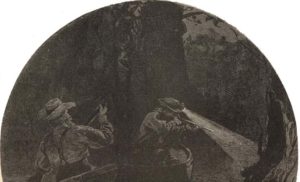
We went down stream, and I had not taken a dozen strokes before a sharp “hist” from the hunter caused me to cease paddling, and for a few seconds our boat drifted with the current, as noiselessly as an autumn leaf, down the bright water path. The gleam of his rifle barrel as Lefiles raised it to his shoulder was followed by the sharp report, and a tremendous splashing in the water just ahead of us. But the bullet had done its work surely, and had crashed into the thick skull, plump between the eyes. The alligator sunk; but with the long slender shaft of the harpoon we quickly found him, and the sharp barbed iron was driven deep into his scaly body. A slight effort brought him to the surface, his specific gravity being but little greater than that of water, and in another minute the hunter had dexterously lodged the ungainly carcass in the boat. Within five minutes after the firing of the rifle-shot the harpoon had been detached from the dead body, and we were quietly paddling up stream in search of another. Within an hour two boat-loads of dead alligators, ten in all, had been killed, secured, and deposited on the little bunch of tussocks, about a quarter of a mile below our camp, that had been selected as our skinning ground. Here we pulled them ashore and piled them in a heap to be operated upon the next day, or after they had become “thoroughly dead,: as Lefils said. All this time I had not seen a single alligator until after he had been shot, and was very anxious to shine” a pair of eyes. So after we had piled our ‘gators on the tussocks, the bull’s-eye was fastened to my head, and with rifle in hand I took my place in the bow of the boat, and Lefils took that I had occupied in the stern. As we pulled out into the stream I moved my head slowly from side to side, as directed by the hunter, and for a few minutes saw nothing save the shining pathway among the dark lily-pads. Suddenly there flashed out from the blackness, right ahead, what appeared two shining lights at a great distance from us. They were of a dark lurid red, and glowed like dull coals of fire. I was about to call Lefils’s attention to them, and ask what they were, when they moved slightly and like an electric shock the knowledge flashed across me that a huge ‘gator lay directly in our path, not more than twenty feet away, and that he was steadfastly regarding us, without showing the slightest disposition to move. With a “hist’ I arrested the progress of the boat, but not until she had drifted so close to the great motionless brute that the end of my rifle barrel almost touched the glowing eyes as I aimed between them and pulled the trigger. The report was followed by such a terrible lashing of the water under our bows that as the boat was swiftly backed from the scene of disturbance she was tossed like a cockle-shell, and I experienced the same sensation as when, years before, I had been forced to sit quietly in the stern-sheets of a boat from which a keen-edged lance had just sent a monster whale into his death flurry.
As we lay beyond the sweep of the terrible tail, watching the death struggle of the huge reptile, Lefils said, disapprovingly: That was a bad shot. You fired too quick. You didn’t kill him half dead enough.” It was very evident that I had not “killed him dead enough”; but his motions were so rapid and the light so uncertain that I had no chance to complete the deadening by another shot, and we were forced to wait patiently until he should become exhausted by his struggles. He did not attempt to move from the place in which we had found him, but circled round and round, now raising his horrid head high into the air, and then lashing the water into a turbid foam with his powerful tail. This state of affairs lasted for ten or fifteen minutes, and then the great reptile sank out of sight, and a few ripples only marked the scene of the recent commotion.
“We can’t afford to lose him; he’s too big,” said the hunter as he picked up his harpoon, and we again exchanged places. A few minutes careful feeling among the bonnet roots, and then the barbed iron was driven downward with the full force of the sinewy arm, and as I backed the boat, Lefils seized his rifle. At there was rush through the water, and by the light of the bull’s-eye, which still remained on my head, I had a vision of wide-open jaws and gleaming teeth. Just as they were about to close upon me, or so it seemed, there came a shot, a rending of wood, and I found myself struggling in the dark waters of the river, the lantern extinguished, and everything shrouded in deepest blackness. As I stood irresolute in water up to my shoulders, a vigorous stream of the most unique oaths from out of the darkness indicated the presence of the ‘gator-hunter. I found that he still held his rifle in his hand, and as his cartridges were water-proof, our predicament was not so alarming nor our loss as serous as had at first appeared. But we were forced to wait until daylight before attempting the recovery of our boat. We waded to the bank, and found ourselves on the tussocks in company with our victims of the earlier hours of our hunt. Although they were supposed to be dead ‘gators, and had been left there as such, several of them showed such unmistakable signs of life as we left the river and crawled out amongst them that they had to be “killed again,’ as Lefils said. He did not waste ammunition on them, but killed them with his hunting-knife, in each case reaching across the animal, and driving the long knife into the body just back of the fore-shoulder. The “why” of this method of procedure was so evident that no questions nor explanations were needed, for the instant the alligator felt the knife, he struck so savagely in the direction from which he supposed the blow to have come, with both head and tail, that had the hunter stood on that side he would have received serious if not fatal injury. Having thus effectually quieted our companions in this our enforced lodging-place, we seated ourselves on one of the scaly bodies, and prepared to pass the hours until daylight as comfortably as possible. The tobacco and matches in my water-proof pouch proved of inestimable value, and in the glowing bowls of our pipes we found a source of cheerfulness which even our wet garments, made colder and wetter by the damp night breeze, could not extinguish. We also succeeded in relighting the bull’s-eye lantern, which was very fortunate, for by its light we discovered and killed a number of venomous water-moccasins which had invaded the tussocks, probably only on speculative visits of inquiry. But possibly with murderous intent. I am not sure, however, that they were not attracted by the light, for in all my six months’ experience of camp life in Florida I have never been troubled by snakes, and doubt very much if they will, unprovoked, attack a man. Our light also attracted several alligators, whose curiosity was repaid by bullets, and whose dead bodies we obtained next day. Had it not been for the clouds of mosquitoes that enveloped us, our night with the ‘gators would have been comparatively comfortable, but they drove us to the verge of insanity, and the first streaks of dawn were hailed with delight.
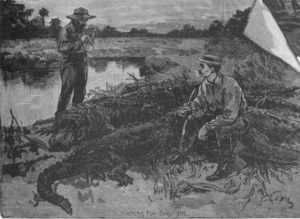 As soon as it became sufficiently light for us to pick our way, we succeeded, partly by wading and partly by swimming, in regaining our camp, were our thorough enjoyment of dry clothes, hot coffee, and a hearty breakfast almost compensated for the discomforts and dangers of the preceding hours. Ion my canoe we repaired to the scene of our disaster, and found our enemy of the right floating on his back, his white belly glistening in the sunlight, stone-dead, and still attached to the sunken skiff by the line, of which one end was fast to the harpoon in his body and the other to the bow of the boat. It seems that when he made his final rush at us Lefils had fired a ball down the yawning chasm of his throat, and that ion his death agony the alligator had seized the side of the boat, and had torn it of from stem to stern. We dragged him up on the tussocks, and measured him, finding him to be within an inch of thirteen feet long. Although during that week we killed one hundred and twenty alligators, no one of them equaled him in size, nor did we have any serious trouble with any other during the hunt.
As soon as it became sufficiently light for us to pick our way, we succeeded, partly by wading and partly by swimming, in regaining our camp, were our thorough enjoyment of dry clothes, hot coffee, and a hearty breakfast almost compensated for the discomforts and dangers of the preceding hours. Ion my canoe we repaired to the scene of our disaster, and found our enemy of the right floating on his back, his white belly glistening in the sunlight, stone-dead, and still attached to the sunken skiff by the line, of which one end was fast to the harpoon in his body and the other to the bow of the boat. It seems that when he made his final rush at us Lefils had fired a ball down the yawning chasm of his throat, and that ion his death agony the alligator had seized the side of the boat, and had torn it of from stem to stern. We dragged him up on the tussocks, and measured him, finding him to be within an inch of thirteen feet long. Although during that week we killed one hundred and twenty alligators, no one of them equaled him in size, nor did we have any serious trouble with any other during the hunt.
After eight days’ hard work we abandoned our comfortable camp, and with heavily laden boats turned our faces up the river toward Fort Bassinger and the civilization which lay beyond.
Contact Capt. Rick
